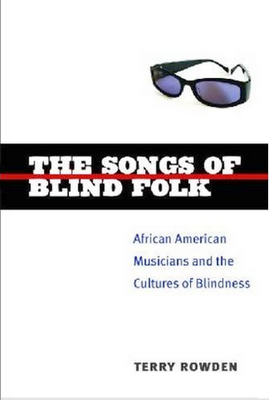The Songs of Blind Folk: African American Musicians and the Cultures of Blindness

Terry Rowden’s book is that rarest of gems, a work of critical theory that should appeal to a broad audience and that contributes simultaneously, in an original and exciting way, to the fields of Disability Studies, Ethnomusicology, and African American Studies. While more casual music fans might be tempted to turn immediately to chapters on Ray Charles and Stevie Wonder, the initial chapters on the cultural politics of blindness and race in the nineteenth century represent a seldom viewed perspective on the nexus of racial and physical difference—and they are no less accessible nor original in their insights than the later chapters on more recognizable figures.
Rowden focuses first on the figure of “Blind Tom Bethune” as a product of nineteenth-century American preoccupation with “freakish attraction.” Bethune was marketed—enslaved, essentially, even after Emancipation, by his managers as a kind of idiot savant, but his popularity and reappropriation by African American folk musicians and poets in the late nineteenth century helped to transform him from a freakish sentimental figure to a more affirmative expression of African American creativity.
The book then traces a lineage of blind blues musicians: those for whom race, age, obscurity, and blindness become part of a musical aesthetic. A chapter on “The Souls of Blind Folk” shows a tradition in gospel and spiritual music that, unlike much of the composition by African American musicians, openly acknowledges the artists’ blindness, which becomes emblematic of the musician’s spiritual condition.
Rowden’s work on Charles and Wonder climax his study. He examines the “Rhetoric of Genius” surrounding Charles and some of his contemporaries, the prodigiously “gifted” artist who is legitimated for mainstream American audiences first by virtue of his physical attractiveness and second by his invention of the sunglasses as an iconic representation of the sightless performer. Wonder is presented as a musician who seemed to achieve “transcendence” over his blindness. He helped dispel the folkloric notion that blindness “was somehow a punishment for some kind of original sin.” His precocious rise to fame Rowden attributes first to excellent musical education and second to his being “cute”—both “little” and “a wonder”—and so unthreatening to the public. By sharp contrast to his forebears, Wonder grew up with what Rowden memorably calls “the cyborgean prosthestics of privilege”—an unprecedented access to technology and financial and personal support. Nonetheless, his career was eclipsed by the advent of MTV and BET and the “image-oriented” musical world of the 1980s and beyond.
The Songs of Blind Folk is both sensitive and provocative, a work of historical scholarship and applied critical theory, an accessible and original addition to ongoing discourses in a variety of disciplines.